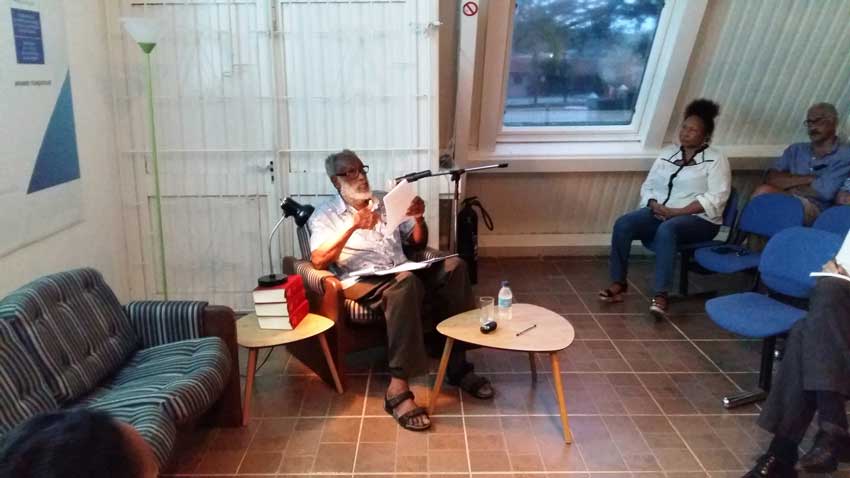Alliance Française hosted the “Voyage dans l’Histoire francophone de Sainte-Lucie” or in English, “Journey through the francophone History of Saint Lucia”; a history conference last week presented by well known local historian Gregor Williams who said that it is a scandal that more St. Lucian history isn’t in our school curriculum.
His presentation touched on the origin and use of our language, the “revolutionary spirit” of St. Lucians throughout history and how St. Lucians of different racial backgrounds oftentimes bandied together to oppose those in power. (Usually the English)
The historian also touched on the French Revolution and the American Revolutionary wars, and the hitherto scarcely known role our island played in both of those monumental historical events.
Williams gave the audience a bit of the historical background of the names of our districts and major towns, dividing those names into two major categories. Either our districts were named after prominent French officers such as Castries, Dennery, Micoud, Laborie and Choiseul (British in the case of Rodney Bay); or they were named after either a geographical or man-made feature of the area like Soufriere, Vieux Fort and Gros Islet.
Speaking to the VOICE, when asked about the general absence of this local history from the school curriculum, Williams advised that “we need to make serious efforts to have a campaign to introduce the teaching of St. Lucian history in St. Lucian schools.”
He noted that “We’re the only island that doesn’t have that; so that is scandalous.”
Williams went on to say that history should be placed on our priority list and that policies such as heritage tourism will reap the benefits from a more historically aware general populace.
“We have young historians coming up who are capable, but also we need to put history on the priority list. We talk about heritage tourism. How much do we do with the heritage to really promote us first? Then the tourists will come and see it.”
Williams said that teaching St. Lucian history and having it as a part of the curriculum in our schools is very important in order to foster in us a sense of our own identity.
It’s important that we teach history in our schools because “it gives us a sense of who we are. Your identity comes from your sense of your own history. And that is very important.” The historian said.
He also spoke to the VOICE about the relatively unknown aspect of St. Lucians of different racial backgrounds coming together to stand up against the then establishment, saying that he chose to broach the topic “because I think that that part of our history is not well known.”
“We think of bétje and nègre…but the reality wasn’t so. Because there was a smooth connection, intermarriages [among] white, black, free coloured and so on; so that was very much part of the society.” Williams said.
Despite being the presenter on the night, Williams also credited Alliance Française Director Evelyn Gasse for coming up with some of the themes touched on in his lecture and also Tourism Development Assistant Solène Le Théry for organising the event.
“I think the young Solène did a good job putting it together, arranging…and so on, so she did a tremendous job on it.” Williams stated.








![Attendees at the UHC logo and website launch [Photo credit: GOSL]](https://thevoiceslu.com/wp-content/uploads/2026/02/Attendees-at-the-UHC-logo-and-website-launch-380x250.jpg)






![Remnants of an alleged drug boat blown up in a lethal strike by the U.S. military last week surfaced off Canouan on Saturday [Photo credit : St Vincent Times]](https://thevoiceslu.com/wp-content/uploads/2026/02/Remnants-of-an-alleged-drug-boat-blown-up-380x250.jpg)
